Join a discussion with Lisa Lowe on Fred Lee’s new book.
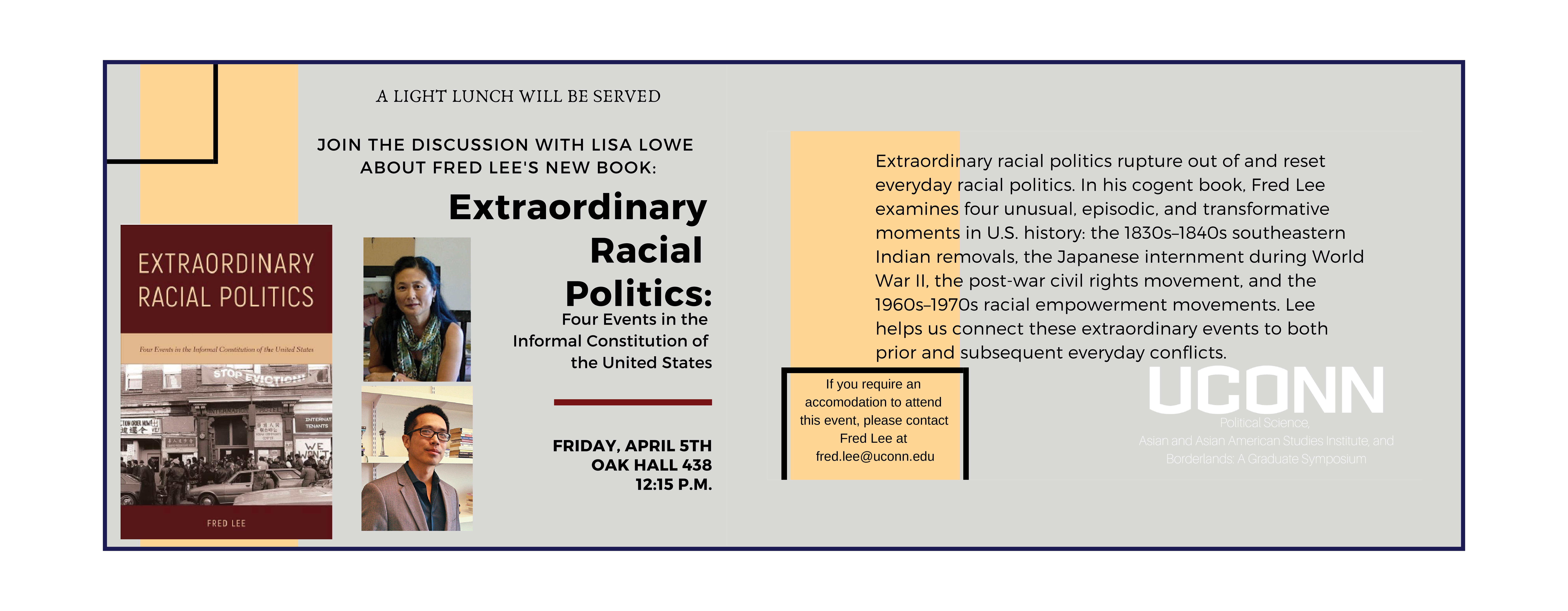
Join a discussion with Lisa Lowe on Fred Lee’s new book.

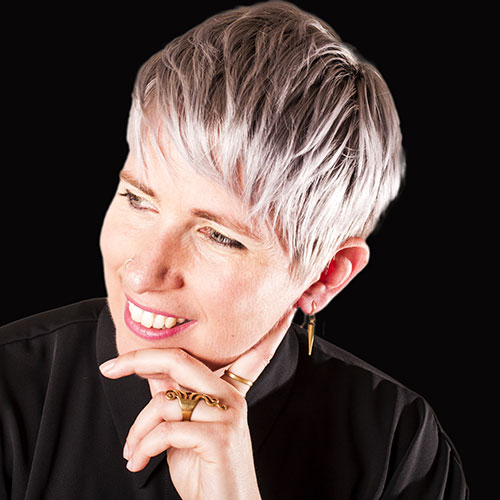
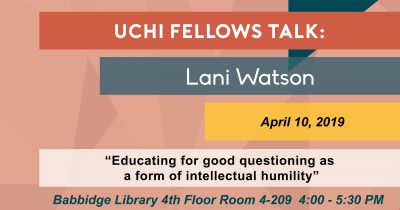
The primary aim of this project is to examine the relationship between questioning and intellectual humility. I take questioning to be a powerful expression of intellectual humility; one that is familiar across cultural and political boundaries, and accessible from an early age. Yet the role and significance of questioning is often overlooked or undermined by our social, cultural, and political institutions, and in education. I aim to examine questioning as a form of intellectual humility and investigate the factors that prevent people from expressing this form of intellectual humility, particularly in education.
My primary philosophical interest is in the practice of questioning. As an epistemologist, I am especially interested in how we use questions in order to gather information and come to know things. For the most part, we are living in a world that values knowing things highly. ‘Knowledge is power’, as Francis Bacon’s (1597) famous Enlightenment adage boldly states. This means that questions are a powerful tool for acquiring something that we value. I am interested in examining how this value system impacts upon our willingness and ability to ask questions.In situations where there exists a real or perceived expectation that one already knows something, one’s ability and/or willingness to ask questions will plausibly be inhibited. I think this is important in a classroom setting where students often feel under pressure to have the right answers at their immediate disposal. I am interested in examining how barriers to questioning manifest in education. Why would a student be either unable or unwilling to engage in questioning in the classroom? What features of our education systems generate, maintain, and schematize barriers to student questioning in schools? And what can teachers, administrators, or policy-makers do to address a lack of student questioning?
I am excited to be collaborating with the Right Question Institute, based in Cambridge, Massachusetts, as part of this project and investigating their sustained efforts to teach questioning to students via the Question Formulation Technique (QFT), developed by Dr Dan Rothstein and Luz Santana. I will focus on the role that this technique plays in generating open-minded and intellectually humble classroom dialogue. Ultimately I aim to defend the claim that educating for good questioning offers an effective and resourceful means of providing students with valuable opportunities to exhibit, practice, and refine the virtue of intellectual humility.
I am very much looking forward to visiting UCHI and working with fellow researchers as part of the Humility and Conviction in Public Life project. It will be great to be part of a group of researchers with common interests in the public expression of intellectual character, which I believe to be an important and timely area of research in philosophy, as well as across the range of disciplines represented by the project and UCHI. Coming from the UK, I am looking forward to working in the US and having the opportunity to learn more about the US education system, through collaborating with the Right Question Institute. Having recently spent time in the US as a post-doctoral fellow at the Institute for the Study of Human Flourishing, at the University of Oklahoma, I can also say that I am greatly looking forward to once again enjoying the delights of the ‘Twinkie’ back on US soil.
As a researcher (and human) I am deeply invested in finding ways in which I can contribute to a better world. What that world can and should look like are questions that can be articulated and explored through the humanities. Without asking questions about the value or meaning of our choices and actions as a society or a species, it is unclear to me what progress in our intellectual or practical endeavours, or indeed in any other domain, would look like. Perhaps most importantly, I believe firmly that a diversity of perspectives must contribute to human thought and progress. Humanities research allows for this diversity through its departure from any single method, approach, or value system.
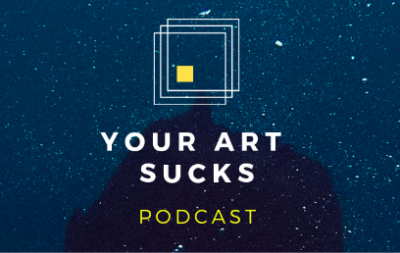
"You should be listening to the podcast “Your Art Sucks”: http://yourartsuckspodcast.com/
The podcast is meant to encourage artists to just keep creating art for the love of art; each episode delves deep into a topic, challenge or roadblock that artists of all types (visual, performance and written) encounter with concrete examples of an artist that failed and one that triumphed. I listen to this podcast, not as an artist, but as a museum registrar and curator who strives to understand the process behind creation.
My absolute favorite episode is the first one exploring self-criticism as a healthy, necessary tool in not just the artist’s, but everyone’s life. Encouragement that all should take the middle path as self-doubt can cripple you if you succumb to it, but also can also create empty pointless art if you are too full of confidence. Jackson Pollock is juxtaposed with Connecticut’s own Sol LeWitt (of which two of his works on are currently on display in the Benton). LeWitt wrote the impassioned letter to his friend and fellow artist, Eva Hesse, that serves as a manifesto for rising above the self-criticism to just do.
Excerpt Letter from Sol LeWitt to Eva Hesse (April 14, 1965)
… Learn to say “Fuck You” to the world once in a while. You have every right to. Just stop thinking, worrying, looking over your shoulder, wondering, doubting, fearing, hurting, hoping for some easy way out, struggling, grasping, confusing, itching, scratching, mumbling, bumbling, grumbling, humbling, stumbling, numbling, rambling, gambling, tumbling, scumbling, scrambling, hitching, hatching, bitching, moaning, groaning, honing, boning, horse-shitting, hair-splitting, nit-picking, piss-trickling, nose sticking, ass-gouging, eyeball-poking, finger-pointing, alleyway-sneaking, long waiting, small stepping, evil-eyeing, back-scratching, searching, perching, besmirching, grinding, grinding, grinding away at yourself. Stop it and just DO…"
-Rachel Zilinski
Registrar and Assistant Curator
William Benton Museum of Art
University of Connecticut
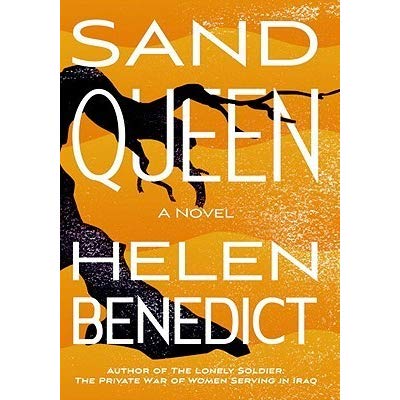
“Ok readers: the "bad" and the truly bad humanities. The queen of "bad" is Lady Gaga The Brilliant. Am already standing in line for tickets to A Star is Born coming out in October. Am already planning to see it numerous times. If "bad" is good, she's one of the best --the Super Bowl of 2017 proved that. Just try to deny her.
The truly bad? War. Wanna go there? Read a slew of novels and memoirs out these days or zero in on the best one in the bunch. Helen Benedict's The Sand Queen is a multivoiced novel of the early American war in Iraq. In one corner is a young American army woman, Kate, continuously tormented by her male comrades-in-arms as they guard an infamous prison camp (Bucca, it actually existed) and continuously tormented as well by the "enemy" male prisoners she oversees. In another corner is an Iraqi woman near Kate's age, Naema, whose male relatives get brutally seized by American troops, leaving the family to stand at the prison camp gates with others to plead for news of all the innocent mistreated male family members held there. Be prepared: there is no redemption in this novel for either character or for the reader, no nicey-nice friendship between Kate and Naema that soothes the pain on both sides. No. it's war, baby. Wanna go now?
See Gaga after reading Queen and imagine the anger she would unleash at those gates."
Christine Sylvester,
Professor of Political Science
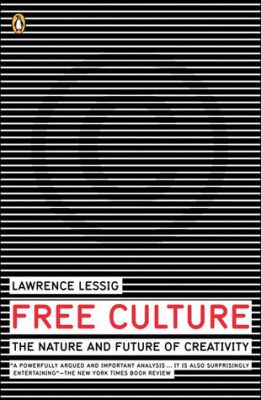
"According to the U.S. Constitution, the purpose of the copyright law is “To promote the Progress of Science and useful Arts.” To achieve this purpose, the Constitution balances two forces against one another. On one side, it harnesses the profit motive, giving creators an “exclusive Right” to sell or license “their respective Writings and Discoveries.” On the other side, it secures this right for “a limited term” so that others might build upon and reinterpret those writings and discoveries.
Over the last century, this balance has gotten out of whack in favor of longer and longer copyright terms and stricter and stricter enforcement of intellectual property rights. In Free Culture: how big media uses technology and the law to lock down culture and control creativity, legal scholar Lawrence Lessig details the history of this unbalancing and shows how the emergence of Internet culture exacerbates it. Lessig argues that the ease with which we can share and remix digital content demands a new balance, one with stronger protections for the public domain. Lessig reminds us that protecting copyright holders and their profits is not the purpose of copyright law, but merely a means of fostering creativity in the body politic. To understand the ways our digital culture changes our thinking about copyright, you should read Free Culture."
-Tom Scheinfeldt
Associate Professor,
Digital, Media & Design Department
Director of Greenhouse Studios
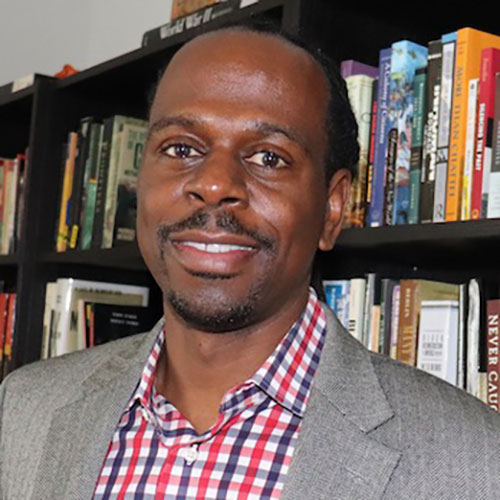
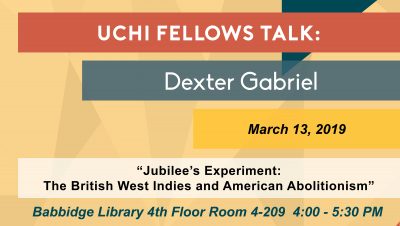
1. Tell us a bit about the project you are working on at UCHI.
My current project, Jubilee’s Experiment: The British West Indies and American Abolitionism, examines the ways in which the emancipated British Caribbean colonies entered into the debates over abolition and African-American citizenship in the United States from the 1830s through the 1860s. It analyzes this discourse as both propaganda and rhetoric, created by abolitionists, black and white, and African-Americans more generally, in antebellum America.
2.What drew you to this topic and what exciting developments are you anticipating?
This was a public discourse, taking place in newspapers, pamphlets, manuscripts, speeches, and even public spectacles. The most prominent of these were annual memorials of British Emancipation. These were held every August 1, primarily in the Northeast. It was coming across a poster for one of these events that first drew me to the topic, as I wanted to know why thousands of American abolitionists and reformers were celebrating the end of slavery in the British West Indies. What did it mean to them? Why did they think it important? What were they hoping to accomplish? As part of my project, I’m working on digitally mapping these August First commemorations as they took place throughout New England. It will be interesting to see what information they provide about attendants, mass mobilization, and social movements in the nineteenth-century.
3. What are you looking forward to in regard to this year at UCHI?
First, I’m looking forward to getting work done on the manuscript. I’m grateful that the fellowship will allow me the space and time needed towards that goal. I’m also looking forward to engaging with the other scholars in residence, and the chance to work, dialogue, share and exchange ideas within a vibrant intellectual community.
4. Many people wonder what value the humanities and humanities research has in today’s world. What are your thoughts on what humanities scholarship “brings to table?”
The humanities remain a fundamental part of a liberal arts education. It helps us explore the human experience and provides a better understanding of both our own society and the world we live in. Within my own work, research into the history of slavery and emancipation helps us understand how people in the past grappled with the immense moral issues of their day—and perhaps offer some insight into how we might do the same in our time.
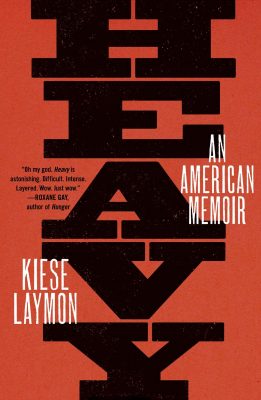
"You should. . . read Kiese Laymon’s Heavy: An American Memoir (Scribner, 2018)
There are so many reasons you should read Kiese Laymon’s intensely personal story, but let’s start with this: writing so alive it jumps off the page and double-dares you to stay up all night with it. You should take that dare, but you should also take it seriously. Addressed to his brilliant, complicated, professor mother, Laymon’s memoir recalls in vivid, often excruciating detail his own experience occupying a large black body in Mississippi—the more to abuse, terrorize, demonize, and shame. The path to adulthood, for Laymon, thus becomes a literal exercise in learning to disappear: as he continues his education in Ohio and Indiana, and goes on to become a professor himself in upstate New York, he starves and runs himself to exhaustion in an effort to become unassailable. We can guess before we know that it’s a futile endeavor because we see the evidence strewn everywhere: the tear gas canisters lobbed over the border at people seeking asylum provide merely the latest proof that ours is a nation still soaking in a hate-fueled white supremacy that just can’t break its habit of inflicting harm upon brown, black, AND LGBTQ bodies. But Laymon’s book offers far more than further evidence of the racism and violence that makes his story a peculiarly American tale. This courageous book is steeped in a politics of love that will help readers develop just the sort of “radical moral imagination” Laymon’s own mother fostered in him and which we will all need if we are to learn how to “talk, listen, organize, imagine, strategize, and fight fight fight” with and for vulnerable children everywhere."
- Kathy Knapp
Associate Professor
Department of English
University of Connecticut
Former UCHI fellow Helen M. Rozwadowski discussed her book “Vast Expanses: A History of the Oceans” on “Time to Eat the Dogs” Podcast.
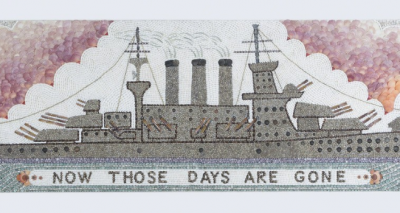
"This beautifully detailed work of art measures three and half feet tall and fourteen feet long, using thousands of shells to depict the USS Kansas. The Kansas was a Connecticut-Class Battleship built in New Jersey and launched in 1905 to become a part of the, so called, Great White Fleet. This fleet, order by President Theodore Roosevelt, consisted of several other battleships that circumnavigated the globe making various military and diplomatic stops to display U.S. naval power in the aftermath of the Spanish-American War. This victory lap around the world sought to celebrate White American racial superiority as the fleet made stops in the recently occupied Caribbean and Pacific Island colonies. The delicate seashell construction contrasts vividly with the brutally destructive power of the battleship with canons, guns, and torpedoes. The warm colored shells in the sky suggest a maritime sunset with radial embellishments in the upper corners. The radiating rays seem to indicate a ubiquitous presence invoking the circumnavigation of the Great White Fleet. Riley’s use of the artwork’s title, now those days are gone, within the piece draw greater attention to multiple inflections of the phrase and it’s relationship to the U.S. imperial power. On the one hand, the phrase invokes a nostalgia for nationalist imperialism, yet the tender construction of the piece reverses this meaning to show it’s fragile nature. The nostalgic interpretation also points to a contemporary decline of U.S. global power and the dangers of reasserting such a position now. Alternatively, the title might indicate that such small battleships, as the Kansas, were immediately eclipsed by the larger, faster, and more deadly Dreadnaught class of battleships. In this interpretation, the days of small battleships are gone, ironically reflected in the tender material of the seashells replaced by behemoth war machines growing ever larger. In the multiple meanings which this artwork puts in play, it also signals a possible future without battleships. One without the racial ideologies and imperial economies which fuel seaborne violence."
- Jason Oliver Chang
Associate Professor of History and Asian American Studies
Director, Asian and Asian American Studies Institute
University of Connecticut
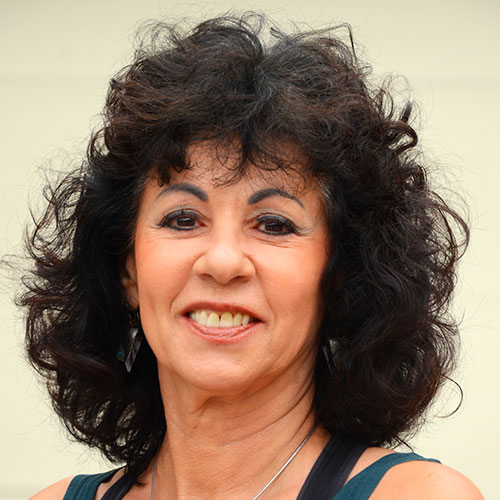
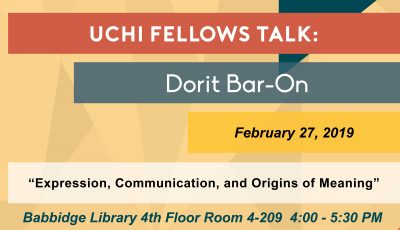
1. Tell us a bit about the project you are working on at UCHI.
We humans are not the only minded creatures in the world. Nonhuman animals, too, can have various affective and cognitive states of mind. But (as far as we know) we are the only creatures who speak their mind. The question of interest to me is how that could come to pass. My project is a philosophical investigation into the origins of linguistic meaning, integrating conceptual tools and theoretical insights from linguistics, comparative psychology, biology of communication, and cognitive science (among other fields).
2. What drew you to this topic and what exciting developments are you anticipating?
I have always been interested in language – its nature and structure, and its connection to mind. In more recent years, having learned about extensive research into animal communication, I became interested in continuities and discontinuities between nonhuman animal communication and human language and the time-old question of how language could have evolved from animal communication.
3. What are you looking forward to in regard to this year at UCHI?
I am planning to complete a manuscript in progress titled Expression, Communication, and Origins of Meaning
4. Many people wonder what value the humanities and humanities research has in today’s world. What are your thoughts on what humanities scholarship “brings to table?”
Based on my experience of talking to people from diverse disciplines over the past 10 years, I see the kind of thinking cultivated in the humanities – broad yet detail-oriented, integrative, attentive to connections of ideas and similarities in patterns of thought – as immensely useful no matter the discipline or inquiry. Humanists’ common intellectual practice of ‘standing back’, taking stock, and adopting a broader perspective can have a transformative effect on any field of research.

UConn Humanities Institute
Homer Babbidge Library, 4th Floor
369 Fairfield Way, Unit 1234
Storrs, CT, 06269
Maps & Directions
Phone +1 (860) 486-9057
Email: uchi@uconn.edu

